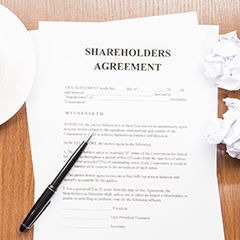Valuations in Shareholder Disputes
October 16, 2017 | Business Plans, Financial Planning, Valuations
 In today’s complex business world, shareholder disputes can be quite common. These disputes can be divisive, long-lasting and expensive, and can arise in almost any privately owned business.
In today’s complex business world, shareholder disputes can be quite common. These disputes can be divisive, long-lasting and expensive, and can arise in almost any privately owned business.
Some of the more common types of lawsuits that may be filed against controlling shareholders are:
Dissenters Rights Actions
Some state laws may give corporate shareholders the right to receive cash payment for the value of their shares, if they do not consent to a major corporate transaction. This gives shareholders an easy way out of the business if they don’t want to be a part of something like a merger or an acquisition.
The shareholder dissent suits come into play with specific actions, such as involuntarily being cashed out in a merger, sale of material assets of the business, recapitalization, or other major changes to an equity owners’ nature of their investment.
Shareholder Oppression Actions
Minority shareholders may assert that they have been treated unfairly by those in control of the corporation, and may seek a buyout of their shares. They may even seek dissolution of the company. If the shareholders determine that the majority has excluded them from their proper share of benefits, oppression remedies may become available.
Standard of Value
Minority shareholders in dissenters’ rights or oppression actions may be entitled to receive the fair value of their shares, rather than fair market value. This means that no adjustments are allowed to be made to the company’s cash flows or preliminary estimate of value for the interest’s relative lack of control or marketability. Fair value also generally excludes any appreciation in value that results from the action to which the minority shareholder dissents.
Shareholder Agreements: Friend or Foe?
Corporate shareholders may enter into contractual agreements to help minimize disputes while specifying owners’ rights and restrictions. But these agreements can also cause disputes, if they’re unclear and the parties interpret their provisions differently. Usually these disputes stem from the value of the interest being redeemed.
There are a number of ways in which an agreement can set a price, including:
- A formula built into the agreement
- Annual setting of the value by the board
- Fixed amount of buy-out
- Book value
- Fair market value to be determined by credentialed valuation professionals
Disputes can often be minimized by proper planning up front. Usually, this consists of a comprehensive, professional shareholder agreement. A few points to keep in mind:
The agreement should be written by an attorney. This seems simple, but many times small business owners see this as a cost-cutting measure and don’t do it.
The draft agreement should be reviewed by a team of people, including the management as well as the company’s accounting and tax professionals. A valuation expert can help ensure you’ve covered all the value-related bases, including defining the appropriate standard of value and outlining a timeline for appraising and redeeming an exiting shareholder’s interest.
Meet with advisers to determine potential areas of dispute in the agreement. It can be a valuable tool in heading off litigation in the future. But, it’s also a living document that may need to be revised as market conditions, company operations and shareholders’ personal lives change over time.
For more information about shareholders agreements, and valuations’ roles in them, talk with Filler & Associates.
